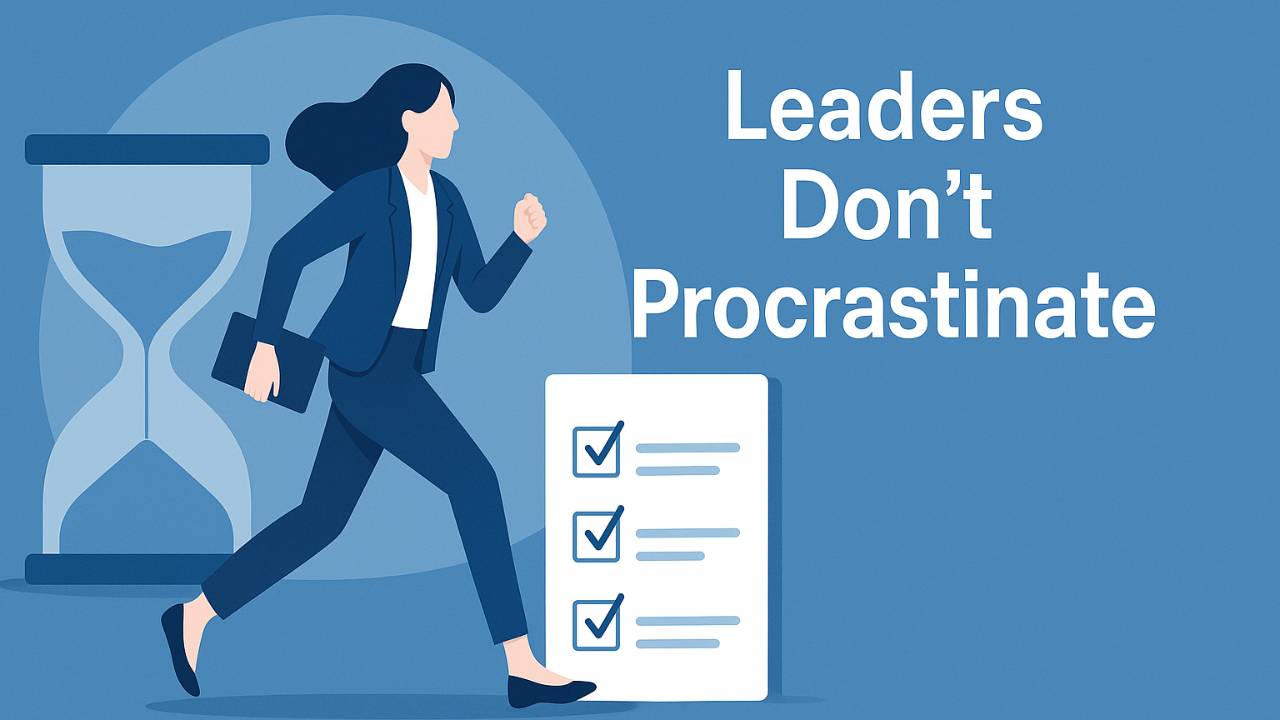Leaders Don't Procrastinate: Truth or Myth?
May 12, 2025
Written by Susan Kuepfer
What is procrastination?
Before we answer that question, we need to define what procrastination is.
Procrastination is the unnecessary delaying of the start or completion of a task (an activity, a project, a decision) that you intend to do, despite knowing there could be negative consequences of that delay. Sometimes it is a conscious choice; often it is not.
What does the data say?
Now let's look at the data to see if leaders procrastinate. Surprisingly, there does not appear to be much research on this.
On one side, there is general research that indicates it is a wide-ranging phenomenon, so leaders were probably included in the statistics that say procrastination is a serious issue in the workplace. There is some general evidence that says globally 1 in 5 adults chronically procrastinate. In the '70s, only 5% of people surveyed said they chronically procrastinated, and now it is reported at 20–25%. More than 80% of people surveyed said they procrastinated at work for at least an hour per day. And if you are wondering, that is not considered chronic procrastination. Only 12% said they did not procrastinate at all or procrastinated less than an hour per day. 40% of people surveyed had lost income due to procrastination.
On the other side, people between the ages of 14–29 years apparently procrastinate the most. So, hopefully, most leaders—who on average are older than this age range—have learned strategies to minimise procrastination.
If you are interested in finding more statistics about procrastination or just checking where the above statistics came from, check out this link. It has some informative and surprising information about procrastination. Just watch out for the labelling. I don't agree with labelling people as procrastinators. Procrastination is a behaviour, not a type of person.
But as a former leader, a leadership coach, and a time management trainer, I know that leaders do procrastinate. I did it, and I see it in the leaders I work with. I can’t tell you how much leaders procrastinate (the average % of their day), but I can tell you without any shred of doubt: “Leaders do procrastinate.”
To procrastinate is human
To procrastinate is human, and until proven otherwise, all leaders are human.
Procrastination is actually a self-defense mechanism. It is one way our minds try to protect us from perceived threats or discomforts. These perceived threats and discomforts come in all shapes and sizes and vary over time. That is why our tendency to procrastinate fluctuates, depending on the context we are in. There are times in our lives when we procrastinate less, and times when we do more. It is not something to be cured; it is something to be understood, accepted, and worked with. Sometimes it’s relatively minor and manageable, and other times, it could be so debilitating it might require outside help like therapy.
Where do you procrastinate?
Here is where I see most leaders procrastinating. As you go through this list, think about which ones do or don't apply to you:
-
Difficult conversations
-
Performance management
-
Delegating (especially new leaders)
-
Stakeholder management
-
Administrative tasks
-
Self-development (career & skills) and self-care (mental and physical health)
-
Life outside of work
-
Developing their teams (as a team and as individuals)
-
Decision making
What do you think you are putting off doing, even though you know it would be better for you and others around you if you did that task now?
What patterns do you see for yourself? If you are not sure, do a time/focus audit of yourself for two to three days. Where did you actually spend your time and focus?
Important note: For this to work, you have to be brutally honest with yourself. And if you are very brave, ask your team for feedback. Where do they see you procrastinate?
How aligned was this with where you think you should be spending your time, energy, and focus?
Note: Sometimes lacking skills on how to do something well (like delegating or offering feedback) can cause procrastination. If you think you need better skills on something to help reduce procrastination, what are you waiting for? Get those skills! But be aware—gaining skills is the easy part. It is using the skills where procrastination usually creeps in.
What is the impact?
The big problem with procrastination in leaders is not only the impact it can have on themselves, but also their teams. There is more and more evidence that employee engagement is at an all-time low overall (see the latest Gallup surveys). If we as leaders are procrastinating in key places, what impact is that having on our team’s engagement and mental health? Is it helping it or reducing it?
Here are some typical impacts:
-
Loss of trust in the leader: Delayed decisions erode team confidence in a leader's reliability and competence.
-
Under-performing teams: Leaders set the pace; procrastination can slow overall progress.
-
Missed opportunities: Hesitation can result in lost chances to innovate or capitalize on critical moments.
-
Increased stress: Accumulated tasks create pressure and more last-minute deadlines, affecting morale.
-
Team conflict: Procrastination can lead to misunderstandings and tension within teams that can fester and grow out of control. And procrastinating on addressing the conflict creates a vicious cycle.
What do you think the impact is of your procrastination(s)?
If we know the impact, why do we still procrastinate?
Why do we procrastinate, when we know there are immediate, mid-term, and even long-term negative consequences for ourselves and our teams?
Well—it’s complicated, as it requires some self-awareness at levels we are not always comfortable with or ready for. We already mentioned that procrastination is a form of self-protection when we feel threatened in some way. Here are some of the typical threats that cause procrastination:
-
Fear and anxiety: Fear of failure, fear of criticism, or anxiety about the outcome are common.
-
Perfectionism: The desire to achieve perfection can cause us to delay tasks, fearing that our work won’t meet our own high standards. This often shows up as not knowing how to start.
-
Task aversion: Tasks perceived as boring, unpleasant, or tedious are often put off. This is closely related to a lack of motivation.
-
Feeling overwhelmed: When faced with too many tasks or unclear expectations, we may feel overwhelmed. We freeze.
What do you think is driving your procrastination behaviour?
What can we do about it?
-
Identify what you're procrastinating about: Be specific about the tasks or projects you're avoiding. Look for patterns.
-
Assess the impact: Consider how the procrastination you have identified in your life affects you and those around you. This will help you prioritise which specific procrastination you would like to reduce.
-
Choose one specific procrastination you would like to reduce. It is easier to work on one thing at a time. If you find a pattern (for example, you tend to procrastinate on a certain type of decision-making), focus on that—and if there is a current example of that pattern in your life, definitely focus on that specific example.
-
Formulate a hypothesis about why you procrastinate on this particular thing. Is it fear of something, lack of motivation, or something else?
-
Develop a plan: Based on your hypothesis and the impact, create a plan to get you into action and reduce that procrastination.
-
Put the plan into action: Start working on your task and be open to adjusting your approach as needed. Ask for feedback. Ask for advice—how it could be better.
Here is a personal story from my side:
In the past, I used to procrastinate on doing my taxes. I would finally get to it when the deadline was reached, only to find I didn't have all the right documents, and I didn't even know what the right documents should have been or where to find them. This caused a lot of stress, a huge energy drain, a waste of time, and less-than-stellar results.
Upon reflection, I realised I was procrastinating because I didn't know how to do it properly, I felt incompetent, I found it incredibly boring and a waste of my time (my general approach to all things administrative), and I feared making mistakes and the consequences of those mistakes.
To overcome this, I did the following:
-
Asked for help: I consulted a tax expert to understand what documents were needed and how to organize them.
-
Created a checklist and folders: I made a simple process for myself with tools I could use every year without having to reinvent the wheel.
-
Gamified the task: My goal was to provide all necessary documents on time with zero errors. This gave me a sense of accomplishment and enjoyment, turning a boring task into a game that I could win. Yes... that is still perfectionism at work—but I turned it (I hope) to my advantage.
So what do you think?
Do you agree with me that leaders do procrastinate? What did you take away from this article that you found helpful? What do you think is missing and could help further? What are you already doing that is helping you minimise procrastination and its impact?
My wish for you
Each procrastination we face is an opportunity to learn more about ourselves and help ourselves be more resilient and resourceful in the future. Turn living productively with procrastination into a lifelong skill. You will benefit, and your team will thank you.
And very, very importantly—if you feel you are chronically procrastinating in some way and it is having a debilitating effect on your life, please do reach out to your doctor and consider therapy. Sometimes the underlying root cause is very deep within us and needs healing before you can move forward. Give yourself that gift.

